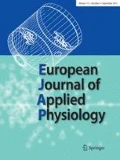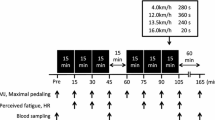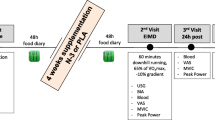Abstract
Purpose
Magnesium supplementation modulates glucose metabolism and inflammation, which could influence exercise performance and recovery. This study investigated the effect of magnesium intake on physiological responses and performance during eccentric exercise and recovery.
Methods
Nine male recreational runners completed a counterbalanced, double-blind, placebo-controlled, cross-over study, registered at ClinicalTrial.gov. Participants consumed low magnesium diets and were supplemented with 500 mg/day of magnesium (SUP) or placebo (CON) for 7 days prior to a 10 km downhill (− 10%) running time trial (TT), separated by a 2-week washout period. At baseline and 24 h post-TT, maximal muscle force was measured. Interleukin-6 (IL-6), soluble interleukin-6 receptor (sIL-6R) and creatine kinase (CK) were measured at rest, 0 h, 1 h and 24 h post-TT. Muscle soreness was measured at the previous times plus 48 h and 72 h post. Glucose and lactate were measured during the TT.
Results
The main effect of condition was detected for IL-6 (SUP: 1.36 ± 0.66 vs CON: 2.06 ± 1.14 pg/ml) (P < 0.05, η2 = 0.54), sIL-6R (SUP: 27,615 ± 8446 vs CON: 24,368 ± 7806 pg/ml) (P < 0.05, η2 = 0.41) and muscle soreness (P < 0.01, η2 = 0.67). Recovery of blood glucose and muscle soreness were enhanced in SUP post-TT. There were no differences in glucose and lactate during the TT, or post measures of CK and maximal muscle force.
Conclusion
Magnesium supplementation reduced the IL-6 response, enhanced recovery of blood glucose, and muscle soreness after strenuous exercise, but did not improve performance or functional measures of recovery.






Similar content being viewed by others
Abbreviations
- ANOVA:
-
Analysis of variance
- CI:
-
Confidence interval
- CK:
-
Creatine kinase
- ES:
-
Effect size
- IL-6:
-
Interleukin-6
- sIL-6R:
-
Soluble interleukin-6 receptor
- SD:
-
Standard deviation
- TT:
-
Time trial
References
Abdelmagid SM, Barr AE, Rico M, Amin M, Litvin J, Popoff SN et al (2012) Performance of repetitive tasks induces decreased grip strength and increased fibrogenic proteins in skeletal muscle: role of force and inflammation. PLoS ONE 7(5):e38359. https://doi.org/10.1371/journal.pone.0038359
Baran P, Hansen S, Waetzig GH, Akbarzadeh M, Lamertz L, Huber HJ et al (2018) The balance of interleukin (IL)-6, IL-6·soluble IL-6 receptor (sIL-6R), and IL-6·sIL-6R·sgp130 complexes allows simultaneous classic and trans-signaling. J Biol Chem 293(18):6762–6775. https://doi.org/10.1074/jbc.RA117.001163
Blancquaert L, Vervaet C, Derave W (2019) Predicting and testing bioavailability of magnesium supplements. Nutrients 11(7):1663. https://doi.org/10.3390/nu11071663
Bohl CH, Volpe SL (2002) Magnesium and exercise. Crit Rev Food Sci Nutr 42(6):533–563. https://doi.org/10.1080/20024091054247
Chen H-Y, Cheng F-C, Pan H-C, Hsu J-C, Wang M-F (2014) Magnesium enhances exercise performance via increasing glucose availability in the blood, muscle, and brain during exercise. PLoS ONE 9(1):e85486. https://doi.org/10.1371/journal.pone.0085486
Chen YJ, Chen HY, Wang MF, Hsu MH, Liang WM, Cheng FC (2009) Effects of magnesium on exercise performance and plasma glucose and lactate concentrations in rats using a novel blood-sampling technique. Appl Physiol Nutr Metabol Physiologie Appliquee, Nutrition et Metabolisme 34(6):1040–1047. https://doi.org/10.1139/H09-105
Cheng S-M, Yang L-L, Chen S-H, Hsu M-H, Chen I-J, Cheng F-C (2010) Magnesium sulfate enhances exercise performance and manipulates dynamic changes in peripheral glucose utilization. Eur J Appl Physiol 108(2):363–369. https://doi.org/10.1007/s00421-009-1235-y
Cohen J (1988) Statistical power analysis for the behavioral sciences. L. Erlbaum Associates, New Jersey
Cullen T, Thomas AW, Webb R, Hughes MG (2016) Interleukin-6 and associated cytokine responses to an acute bout of high-intensity interval exercise: the effect of exercise intensity and volume. Appl Physiol Nutr Metab 41(8):803–808. https://doi.org/10.1139/apnm-2015-0640
Cullen T, Thomas AW, Webb R, Phillips T, Hughes MG (2017) sIL-6R is related to weekly training mileage and psychological well-being in athletes. Med Sci Sports Exerc 49(6):1176–1183. https://doi.org/10.1249/MSS.0000000000001210
De Jongh RF, Vissers KC, Meert TF, Booij LHDJ, De Deyne CS, Heylen RJ (2003) The role of interleukin-6 in nociception and pain. Anesthes Analges 96(4):1096–1103 (table of contents)
Dill DB, Costill DL (1974) Calculation of percentage changes in volumes of blood, plasma, and red cells in dehydration. J Appl Physiol 37(2):247–248. https://doi.org/10.1152/jappl.1974.37.2.247
Dmitrašinović G, Pešić V, Stanić D, Plećaš-Solarović B, Dajak M, Ignjatović S (2016) ACTH, cortisol and IL-6 levels in athletes following magnesium supplementation. J Med Biochem 35(4):375–384. https://doi.org/10.1515/jomb-2016-0021
Eston RG, Finney S, Baker S, Baltzopoulos V (1996) Muscle tenderness and peak torque changes after downhill running following a prior bout of isokinetic eccentric exercise. J Sports Sci 14(4):291–299. https://doi.org/10.1080/02640419608727714
Febbraio MA, Steensberg A, Keller C, Starkie RL, Nielsen HB, Krustrup P et al (2003) Glucose ingestion attenuates interleukin-6 release from contracting skeletal muscle in humans. J Physiol 549(Pt 2):607–612. https://doi.org/10.1113/jphysiol.2003.042374
Fine KD, Santa Ana CA, Porter JL, Fordtran JS (1991) Intestinal absorption of magnesium from food and supplements. J Clin Investig 88(2):396–402. https://doi.org/10.1172/JCI115317
Finstad EW, Newhouse IJ, Lukaski HC, Mcauliffe JE, Stewart CR (2001) The effects of magnesium supplementation on exercise performance. Med Sci Sports Exerc 33(3):493–498. https://doi.org/10.1097/00005768-200103000-00024
Gandevia SC (2001) Spinal and supraspinal factors in human muscle fatigue. Physiol Rev 81(4):1725–1789. https://doi.org/10.1152/physrev.2001.81.4.1725
Garfinkel L, Garfinkel D (1985) Magnesium regulation of the glycolytic pathway and the enzymes involved. Magnesium 4(2–3):60–72
Glund S, Deshmukh A, Long YC, Moller T, Koistinen HA, Caidahl K et al (2007) Interleukin-6 directly increases glucose metabolism in resting human skeletal muscle. Diabetes 56(6):1630–1637. https://doi.org/10.2337/db06-1733
Gray SR, Ratkevicius A, Wackerhage H, Coats P, Nimmo MA (2009) The effect of interleukin-6 and the interleukin-6 receptor on glucose transport in mouse skeletal muscle. Exp Physiol 94(8):899–905. https://doi.org/10.1113/expphysiol.2009.048173
Hardwick LL, Jones MR, Brautbar N, Lee DB (1990) Site and mechanism of intestinal magnesium absorption. Miner Electrolyte Metab 16(2–3):174–180
Heffernan SM, Horner K, De Vito G, Conway GE (2019) The role of mineral and trace element supplementation in exercise and athletic performance: a systematic review. Nutrients. https://doi.org/10.3390/nu11030696
Institute of Medicine U.S. (1997) Dietary reference intakes for calcium, phosphorus, magnesium, vitamin D, and fluoride. National Academies, Washington, D.C. https://doi.org/10.17226/5776
Kamran M, Kharazmi F, Malekzadeh K, Talebi A, Khosravi F, Soltani N (2018) Effect of long-term administration of oral magnesium sulfate and insulin to reduce streptozotocin-induced hyperglycemia in rats: the role of Akt2 and IRS1 gene expressions. Biol Trace Elem Res. https://doi.org/10.1007/s12011-018-1555-z
Kass LS, Poeira F (2015) The effect of acute vs chronic magnesium supplementation on exercise and recovery on resistance exercise, blood pressure and total peripheral resistance on normotensive adults. J Int Soc Sports Nutr 12(1):19. https://doi.org/10.1186/s12970-015-0081-z
Lukaski HC (2000) Magnesium, zinc, and chromium nutriture and physical activity. Am J Clin Nutr 72(2):585S–593S. https://doi.org/10.1093/ajcn/72.2.585S
Lukaski HC, Nielsen FH (2002) Dietary magnesium depletion affects metabolic responses during submaximal exercise in postmenopausal women. J Nutr 132(5):930–935. https://doi.org/10.1093/jn/132.5.930
Mackey AL, Kjaer M, Dandanell S, Mikkelsen KH, Holm L, Døssing S et al (2007) The influence of anti-inflammatory medication on exercise-induced myogenic precursor cell responses in humans. J Appl Physiol (Bethesda, Md. : 1985) 103(2):425–431. https://doi.org/10.1152/japplphysiol.00157.2007
McCoy M, Proietto J, Hargreaves M (1996) Skeletal muscle GLUT-4 and postexercise muscle glycogen storage in humans. J Appl Physiol 80(2):411–415. https://doi.org/10.1152/jappl.1996.80.2.411
Mikkelsen UR, Langberg H, Helmark IC, Skovgaard D, Andersen LL, Kjaer M, Mackey AL (2009) Local NSAID infusion inhibits satellite cell proliferation in human skeletal muscle after eccentric exercise. J Appl Physiol (Bethesda, Md. : 1985) 107(5):1600–1611. https://doi.org/10.1152/japplphysiol.00707.2009
Nielsen FH, Lukaski HC (2006) Update on the relationship between magnesium and exercise. Magnes Res 19(3):180–189. https://doi.org/10.1684/mrh.2006.0060
Petersen AMW, Pedersen BK (2005) The anti-inflammatory effect of exercise. J Appl Physiol 98(4):1154–1162. https://doi.org/10.1152/japplphysiol.00164.2004
Pincus T, Bergman M, Sokka T, Roth J, Swearingen C, Yazici Y (2008) Visual analog scales in formats other than a 10 centimeter horizontal line to assess pain and other clinical data. J Rheumatol 35(8):1550–1558
Pokora I, Kempa K, Chrapusta SJ, Langfort J (2014) Effects of downhill and uphill exercises of equivalent submaximal intensities on selected blood cytokine levels and blood creatine kinase activity. Biol Sport 31(3):173–178. https://doi.org/10.5604/20831862.1111434
Portalatin M, Winstead N (2012) Medical management of constipation. Clin Colon Rectal Surg 25(1):12–19. https://doi.org/10.1055/s-0032-1301754
Quamme GA (2008) Recent developments in intestinal magnesium absorption. Curr Opin Gastroenterol 24(2):230–235. https://doi.org/10.1097/MOG.0b013e3282f37b59
Robson-Ansley P, Cockburn E, Walshe I, Stevenson E, Nimmo M (2010) The effect of exercise on plasma soluble IL-6 receptor concentration: a dichotomous response. Exerc Immunol Rev 16:56–76
Robson-Ansley PJ, Blannin A, Gleeson M (2007) Elevated plasma interleukin-6 levels in trained male triathletes following an acute period of intense interval training. Eur J Appl Physiol 99(4):353–360. https://doi.org/10.1007/s00421-006-0354-y
Robson-Ansley PJ, de Milander L, Collins M, Noakes TD (2004) Acute interleukin-6 administration impairs athletic performance in healthy, trained male runners. Can J Appl Physiol Revue Canadienne de Physiologie Appliquee 29(4):411–418. https://doi.org/10.1139/h04-026
Romani AM, Matthews VD, Scarpa A (2000) Parallel stimulation of glucose and Mg(2+) accumulation by insulin in rat hearts and cardiac ventricular myocytes. Circ Res 86(3):326–333
Schuchardt JP, Hahn A (2017) Intestinal absorption and factors influencing bioavailability of magnesium-an update. Curr Nutr Food Sci 13(4):260–278. https://doi.org/10.2174/1573401313666170427162740
Setaro L, Santos-Silva PR, Nakano EY, Sales CH, Nunes N, Greve JM, Colli C (2014) Magnesium status and the physical performance of volleyball players: effects of magnesium supplementation. J Sports Sci 32(5):438–445. https://doi.org/10.1080/02640414.2013.828847
Shirreffs SM, Maughan RJ (1997) Whole body sweat collection in humans: an improved method with preliminary data on electrolyte content. J Appl Physiol 82(1):336–341. https://doi.org/10.1152/jappl.1997.82.1.336
Solaimani H, Soltani N, MaleKzadeh K, Sohrabipour S, Zhang N, Nasri S, Wang Q (2014) Modulation of GLUT4 expression by oral administration of Mg(2+) to control sugar levels in STZ-induced diabetic rats. Can J Physiol Pharmacol 92(6):438–444. https://doi.org/10.1139/cjpp-2013-0403
Stauber WT (2004) Factors involved in strain-induced injury in skeletal muscles and outcomes of prolonged exposures. J Electromyogr Kinesiol 14(1):61–70. https://doi.org/10.1016/j.jelekin.2003.09.010
Terblanche S, Noakes TD, Dennis SC, Marais D, Eckert M (1992) Failure of magnesium supplementation to influence marathon running performance or recovery in magnesium-replete subjects. Int J Sport Nutr 2(2):154–164
Vargas NT, Marino F (2014) A neuroinflammatory model for acute fatigue during exercise. Sports Med 44(11):1479–1487. https://doi.org/10.1007/s40279-014-0232-4
Veronese N, Berton L, Carraro S, Bolzetta F, De Rui M, Perissinotto E et al (2014) Effect of oral magnesium supplementation on physical performance in healthy elderly women involved in a weekly exercise program: a randomized controlled trial. Am J Clin Nutr 100(3):974–981. https://doi.org/10.3945/ajcn.113.080168
Walshe I, Robson-Ansley P, St Clair Gibson A, Lawrence C, Thompson KG, Ansley L (2010) The reliability of the IL-6, sIL-6R and sgp130 response to a preloaded time trial. Eur J Appl Physiol 110(3):619–625. https://doi.org/10.1007/s00421-010-1548-x
Wedell-Neergaard A-S, Lang Lehrskov L, Christensen RH, Legaard GE, Dorph E, Larsen MK et al (2019) Exercise-induced changes in visceral adipose tissue mass are regulated by IL-6 signaling: a randomized controlled trial. Cell Metab 29(4):844–855. https://doi.org/10.1016/J.CMET.2018.12.007
Author information
Authors and Affiliations
Contributions
CJS and TC designed the study. CJS, TC, MDC and GK conducted laboratory experiments. CJS, TC, ZY and YL analysed data. CJS and TC drafted the manuscript. All authors read and approved the manuscript.
Corresponding author
Ethics declarations
Conflict of interest
The authors declare that they have no conflicts of interest.
Additional information
Communicated by Michael Lindinger.
Publisher's Note
Springer Nature remains neutral with regard to jurisdictional claims in published maps and institutional affiliations.
Rights and permissions
About this article
Cite this article
Steward, C.J., Zhou, Y., Keane, G. et al. One week of magnesium supplementation lowers IL-6, muscle soreness and increases post-exercise blood glucose in response to downhill running. Eur J Appl Physiol 119, 2617–2627 (2019). https://doi.org/10.1007/s00421-019-04238-y
Received:
Accepted:
Published:
Issue Date:
DOI: https://doi.org/10.1007/s00421-019-04238-y




